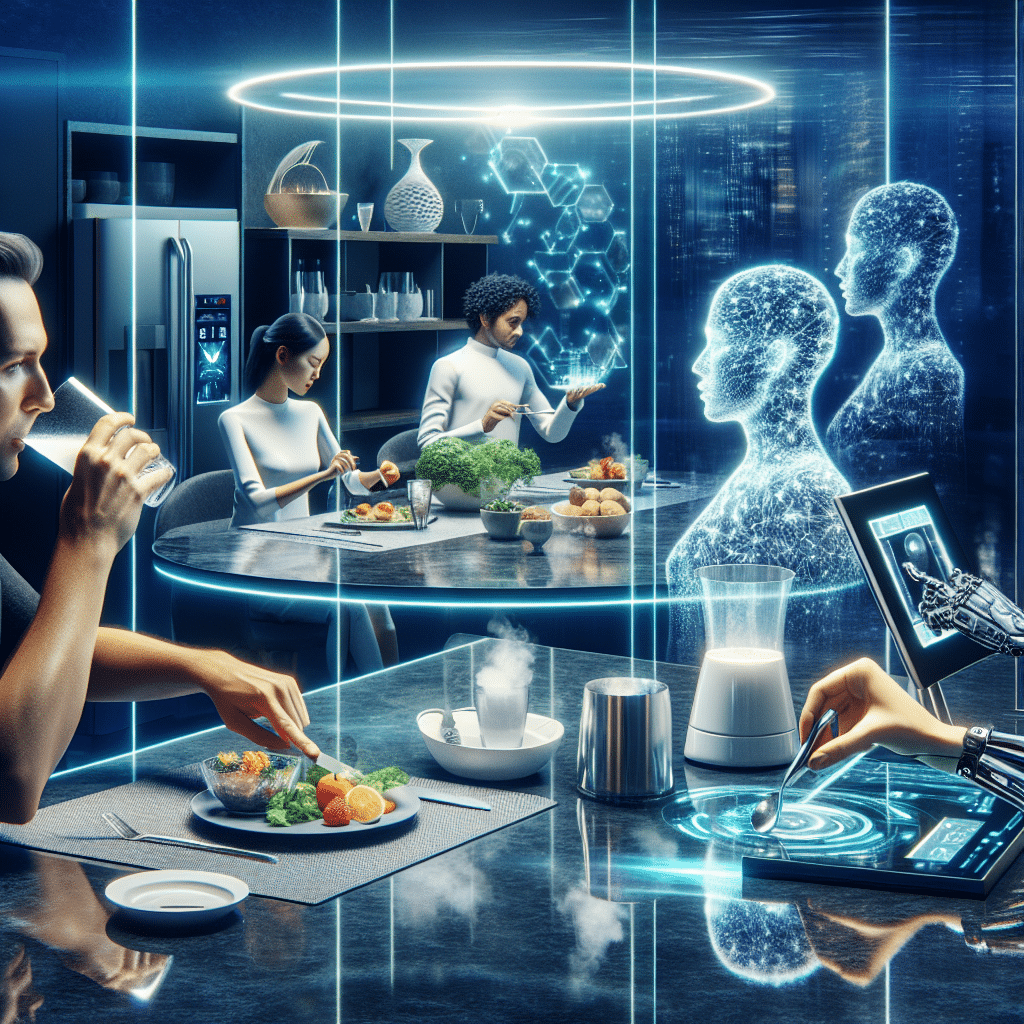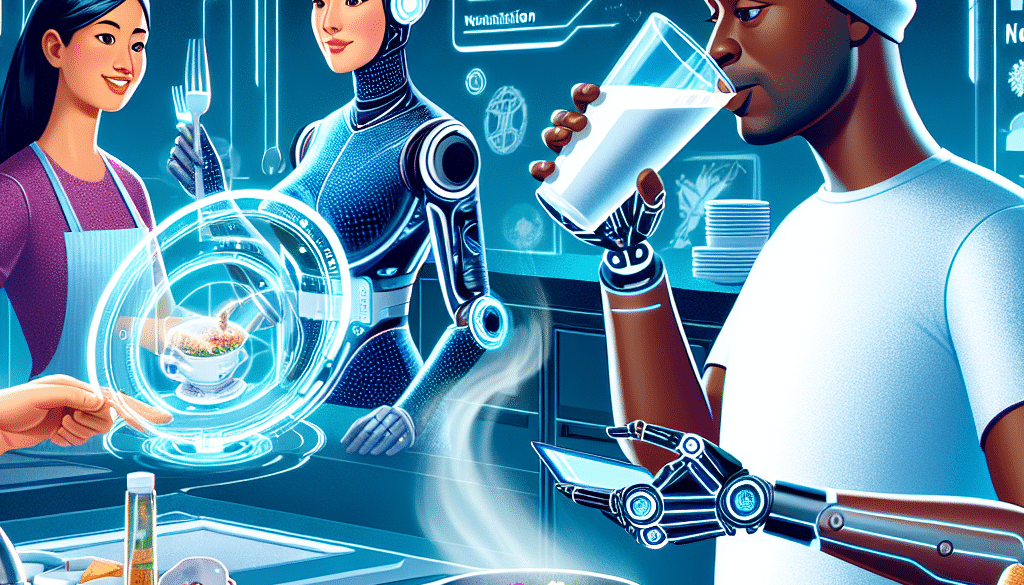Digitalization Modifying The Way Of Eating, Drinking, And Cooking Too!
-
Table of Contents
- Digitalization Revolutionizing Our Eating, Drinking, and Cooking Habits
- The Impact of Digitalization on Food Consumption
- Smart Technology in the Kitchen
- Personalized Nutrition and Diet Apps
- Food and Beverage E-commerce
- Virtual Cooking Classes and Experiences
- Conclusion: The Future of Food in the Digital Age
- ETprotein: Enhancing Your Digitalized Culinary Journey
Digitalization Revolutionizing Our Eating, Drinking, and Cooking Habits

The digital age has transformed countless aspects of our daily lives, and the way we eat, drink, and cook is no exception. From the convenience of online grocery shopping to the rise of smart kitchen appliances, digitalization is reshaping our food experiences. This article delves into the various ways digital technology is modifying our culinary practices, offering insights into the future of food and beverage consumption.
The Impact of Digitalization on Food Consumption
Technology has significantly altered the landscape of food consumption. With the advent of food delivery apps and online meal kits, access to a variety of cuisines and ingredients has never been easier. Here are some key areas where digitalization is making its mark:
- Online Grocery Shopping: The convenience of ordering groceries online has led to a surge in this sector. According to a report by Coresight Research, U.S. online grocery sales grew by 54% in 2020, reaching an estimated $95.82 billion.
- Meal Delivery Services: Platforms like UberEats, Grubhub, and DoorDash have revolutionized the way we order food, offering delivery from a wide range of restaurants directly to our doorstep.
- Meal Kit Subscriptions: Services like Blue Apron and HelloFresh provide pre-portioned ingredients and recipes, simplifying the cooking process and reducing food waste.
Smart Technology in the Kitchen
Smart kitchen appliances are changing the way we cook, making the process more efficient and enjoyable. Here’s how:
- Smart Ovens: These ovens can be controlled remotely via smartphone apps, allowing for preheating and cooking adjustments on the go.
- Connected Refrigerators: With features like internal cameras and expiration tracking, smart fridges help manage groceries and reduce waste.
- Recipe Apps and Cooking Guides: Digital cookbooks and apps provide step-by-step instructions, making it easier for home cooks to try new dishes.
Personalized Nutrition and Diet Apps
Digital tools are also personalizing the way we approach nutrition and diet. Apps like MyFitnessPal and Noom offer customized meal plans and track dietary intake, while DNA-based nutrition services provide recommendations based on genetic profiles.
Food and Beverage E-commerce
The rise of e-commerce has extended to the food and beverage industry, with online sales of these products growing rapidly. According to Statista, global e-commerce sales of food and beverage are projected to reach $20.4 billion by 2023.
Virtual Cooking Classes and Experiences
The pandemic has accelerated the popularity of virtual cooking classes, allowing people to learn from chefs around the world from the comfort of their homes. This trend is likely to continue as consumers seek new culinary experiences.
Conclusion: The Future of Food in the Digital Age
Digitalization is not only changing the way we eat, drink, and cook but also how we think about food. With the integration of technology in our kitchens and the rise of personalized nutrition, the future of food consumption is poised for further innovation. As we embrace these changes, it’s clear that our culinary experiences will continue to evolve, offering convenience, variety, and customization like never before.
ETprotein: Enhancing Your Digitalized Culinary Journey
As we adapt to the digitalized world of food, incorporating high-quality ingredients into our diets remains essential. ETprotein offers a range of organic bulk vegan proteins and L-(+)-Ergothioneine (EGT) products that cater to the health-conscious consumer. Whether you’re a food manufacturer or a home cook, ETprotein’s products can elevate your culinary creations.
About ETprotein:
ETprotein, a reputable protein and L-(+)-Ergothioneine (EGT) Chinese factory manufacturer and supplier, is renowned for producing, stocking, exporting, and delivering the highest quality organic bulk vegan proteins and L-(+)-Ergothioneine. They include Organic rice protein, clear rice protein, pea protein, clear pea protein, watermelon seed protein, pumpkin seed protein, sunflower seed protein, mung bean protein, peanut protein, and L-(+)-Ergothioneine EGT Pharmaceutical grade, L-(+)-Ergothioneine EGT food grade, L-(+)-Ergothioneine EGT cosmetic grade, L-(+)-Ergothioneine EGT reference grade and L-(+)-Ergothioneine EGT standard. Their offerings, characterized by a neutral taste, non-GMO, allergen-free attributes, with L-(+)-Ergothioneine purity over 98%, 99%, cater to a diverse range of industries. They serve nutraceutical, pharmaceutical, cosmeceutical, veterinary, as well as food and beverage finished product distributors, traders, and manufacturers across Europe, USA, Canada, Australia, Thailand, Japan, Korea, Brazil, and Chile, among others.
ETprotein specialization includes exporting and delivering tailor-made protein powder and finished nutritional supplements. Their extensive product range covers sectors like Food and Beverage, Sports Nutrition, Weight Management, Dietary Supplements, Health and Wellness Products, and Infant Formula, ensuring comprehensive solutions to meet all your protein needs.
As a trusted company by leading global food and beverage brands and Fortune 500 companies, ETprotein reinforces China’s reputation in the global arena. For more information or to sample their products, please contact them and email sales(at)ETprotein.com today.














